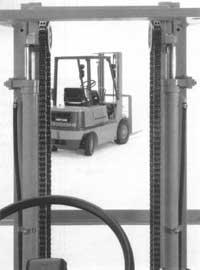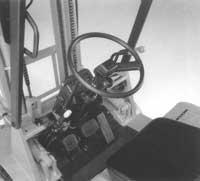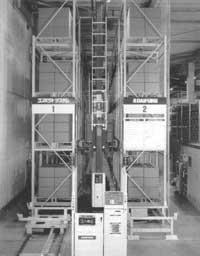Oinakar: automatic warehouse path
Due to competition between companies, automation is being implemented at different levels of the production chain. However, once the product is created, it is necessary to store it and here a new phase begins, that is, storage. For information on this matter, we have visited the most advanced company specialized in the automatic storage system in the Basque Country, Oinakar. In it the engineer Jon Ander Mujika intervened.

The company OINAKAR belongs to the cooperative group ULMA. Within this group are companies dedicated to agriculture, construction, tableware and packaging, forging and maintenance.
This company located in Oñati manufactures mainly two products: the forklift and the automatic warehouse. To do this they maintain relations with two prestigious Japanese companies.
In the area of forklift trucks, together with the company MITSUBISHI, they sell sixteen different models. These cars can collect weights between 1 and 3.5 tons. To operate the engine you can use gasoline, liquefied gas, propane and diesel, and the noise obtained is much lower than that of the old model.
Other outstanding features are the carts. On the one hand the monitor of the picture is illuminated to work during the night. On the other hand, the steering is hydraulic and can be manual.
However, the most important product marketed by Oinakar is the AUTOMATIC WAREHOUSE. Jon Ander Mujika is the expert in this field.
Like the collaboration agreement with the Japanese company MITSUBISHI on forklift trucks, in the automatic repository they maintain a collaboration agreement with the local company DAIFUKU. This company, founded in 1937, already has 50% of the Japanese market.

Jon Ander was asked about the most suitable type of product to store in this storage system. His answer was: “The automatic storage system is suitable for any product to be stored; pharmaceutical drugs, electrical appliances, bag cement, paint cans or cans, machining parts, etc.” Any palletized product can be used.
The system generally includes the following aspects. On the one hand there are parallel shelves, with passage between two shelves. The length of the shelves can be desired and its height ranges from 2 to 15 m. In the hallway there is a lane on which a car moves. This cart takes the pieces and leaves them on the shelf. For this it is placed in the necessary place and makes the necessary movements to be able to catch the desired pieces. The movements of translation and elevation needed to carry out these actions are fast and smooth.
Structure of an automatic storage unit
The control of this system can be done manually or by computer, but it is much more interesting to do it by computer. You can have a thorough control of the stock by computer, since when the cart takes or leaves something from the shelf you have to inform the computer beforehand.
Orders that are given to the computer cart can be given at any time, that is, you do not have to wait to be able to give a new order until an action ends. The shelves are numbered and ordered. On the one hand we have the shelves left and right. On the other hand, taking the left or the right, they are numbered horizontally, that is, 1, 2, 3, ... etc. and finally to each shelf numbered horizontally is added a number indicating the vertical position. For example, “left, 18, 3” means: “On the shelf on the left it horizontally counts 18 shelves and starts on the floor by 3 shelves up.”
Automatic storage system control is performed by own personnel without any problems. All stock movements are transported to the factory's central computer, for example via a network, thus greatly facilitating accounting.

When the place of production and the place of storage are automated and connected it is essential to perform computer control.
However, the automated warehouse, in addition to the items mentioned above, may contain more components. For example, once the cart takes a piece from the shelf and takes it to the exit table, the table can be replaced by a conveyor belt or a robot cart, so that the piece can be transported elsewhere in the workshop.
Depending on the needs and economic possibilities, each workshop should see how much it can automate its warehouse. Therefore, there can be all kinds of automated storage, the most basic being described in this article.
Therefore, the automation costs of a tank can be very different in each case. Despite the difficulty of offering specific prices, a small business can achieve a sufficient level of automation with an investment of 15,000,000 pesetas. Costs in large companies can reach 500,000,000 pesetas.
This innovation requires new organizations and approaches in business organization. In this process of innovation, in addition to entrepreneurs, workers must be involved, some through these new techniques in the modernization of companies and others in the substitution of physical work by iron.
Finally, we want to thank Jon Ander Mujika for what he has shown us.






